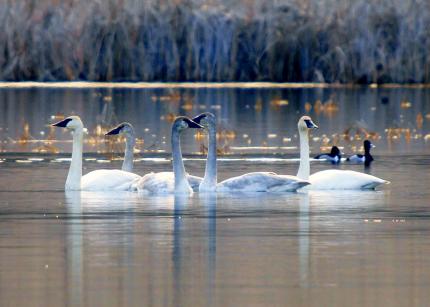ARCHIVED NEWS RELEASE
This document is provided for archival purposes only. Archived documents
do not reflect current WDFW regulations or policy and may contain factual
inaccuracies.
News release Nov. 13, 2019
Kyle Spragens, 360-902-2522
Sam Montgomery, 360-688-0721
Hotline to report dead, sick, or injured swans available
OLYMPIA - Trumpeter and tundra swans are returning to Whatcom, Skagit, Snohomish, and other western Washington counties this fall. The Washington Department of Fish and Wildlife (WDFW) has re-established a hotline to report dead, sick, or injured swans in northwest Washington counties. This is part its ongoing effort to assess the impact of lead poisoning on trumpeter and tundra swans.
People can call (360) 466-4345, ext. 266, to report dead, sick or injured swans in Whatcom, Skagit, Snohomish, and other western Washington counties. Callers should be prepared to leave a short detailed message including their name, phone number, location, and condition of the swans. The hotline is available 24/7 through the end of March.

Some trumpeter and tundra swans in those counties, and in southwestern British Columbia, die each winter from lead poisoning after ingesting lead shot and other lead objects in areas where they feed.
Lead shot has been banned for waterfowl hunting in Washington since 1991. Swans can still pick up and ingest lead shot while foraging in shallow underwater areas, in fields, and roosts where lead shot is still present. Swans are also vulnerable to collisions with powerlines.
“If you observe dead, sick, or injured swans, do not handle or collect the birds,” said Daniel Zimmerman, WDFW biologist. “Call the hotline instead.”
WDFW and Puget Sound Energy employees, as well as volunteers from the Northwest Swan Conservancy Association, will pick up the birds.
WDFW and other agencies and organizations have been working since 2001 to locate sources of toxic lead and minimize potential exposure through management actions.
The Washington Department of Fish and Wildlife is the state agency tasked with preserving, protecting and perpetuating fish, wildlife, and ecosystems, while providing sustainable fishing and hunting opportunities.